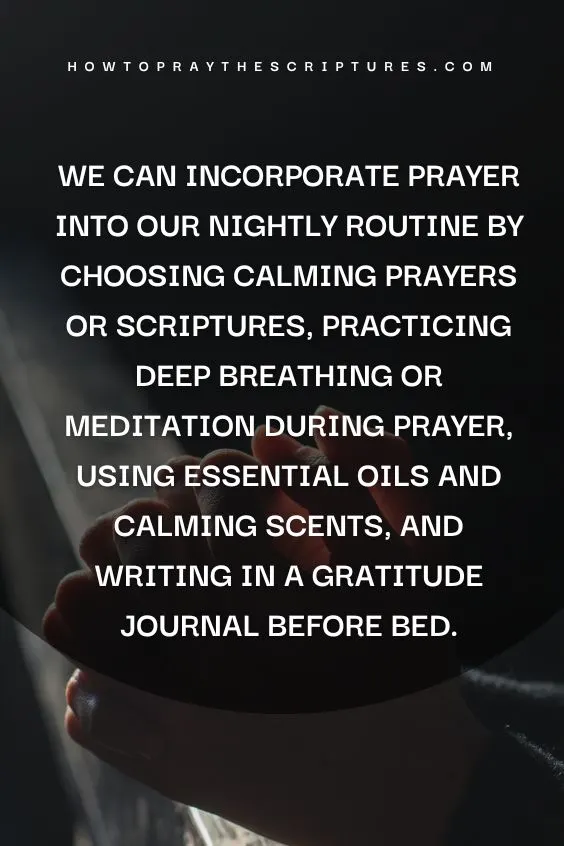Prayer is an age-old solution for people who struggle to find comfort and protection in slumber. If that sounds like you, then you know how hard it can be trying to fall asleep or staying asleep throughout the night.
We understand this struggle, which is why we dug deep into how prayer can help improve sleep quality. The research uncovered some fascinating insights! In this blog post, we’ll explore how the power of prayer can break down stress levels and bring on positive thoughts that will lead to a peaceful restful sleep session—all through the ancient act of bedtime prayers.
The Impact of Prayer on Sleep
Through prayer, we can reduce our stress and anxiety levels and improve the quality of our sleep.

Does Praying Help You Sleep?
Reduction of stress and anxiety
Prayer can be a powerful tool for reducing stress and calming the mind. When we pray, we send our worries and fears to God in an act of surrender. Allowing ourselves to seek divine guidance for help can activate the parasympathetic nervous system, which is responsible for helping us relax and let go of tension.
Prayer also promotes psychological well-being by releasing hormones, such as oxytocin, which relieve symptoms of stress-related disorders like anxiety or depression. For Christians, in particular, prayer provides spiritual support by cultivating positive thoughts, emotions, and gratitude—qualities that are needed to find inner peace even during difficult times.
Through prayer, we can hope to experience relief from negative mental states without feeling alone or abandoned in our suffering.
Improved quality of sleep
Prayer can make a significant impact on the quality of sleep that we experience. Studies have found that praying can lessen stress and anxiety, two of the most common causes behind poor sleep.
For Christians, prayer is a way to form an intimate spiritual connection with the Lord, which can help reduce mental and emotional stress associated with life’s struggles and everyday problems.
In addition to reducing stress and improving emotional well being, prayers activate the parasympathetic nervous system in our body, which relaxes us into the deep state of relaxation required for sound sleep.
Praying also releases hormones like oxytocin and melatonin, which further induce relaxation in our mind from unwanted thoughts or worries, as well as promoting healthy sleep patterns.
How Prayer Helps Improve Sleep
Prayer activates the parasympathetic nervous system, releasing hormones like oxytocin and melatonin for a soothing effect that helps us relax better and sleep peacefully.

Does Praying Help You Sleep?
Activation of the parasympathetic nervous system
Prayer is a powerful form of healing that can have profound effects on the body. One area where prayer has a significant impact is its ability to activate the parasympathetic nervous system and bring about relaxation.
The parasympathetic nervous system helps regulate bodily functions like digestion, blood pressure, heart rate, respiration, and hormone production. Activation of this important part of your autonomic nervous system leads to increased feelings of peace and well-being and prepares our bodies for restful sleep.
Research shows that regular prayer suppresses the activity in the limbic system—a key brain region involved in the stress response—leading to improved sleep quality at night. Meditation techniques or focused attention therapy (FAM) are also known to stimulate the parasympathetic nervous response, allowing us to let go of fear and negative thoughts while cultivating positive emotions, such as joy, love, gratitude, and contentment. It’s no surprise then that taking time for intentional prayer before bedtime can be incredibly beneficial for those seeking better quality sleep!
Release of hormones like oxytocin and melatonin
When we pray, it activates neural pathways in the brain, which leads to the release of hormones like oxytocin and melatonin that enhance our sleep quality. Oxytocin, also known as the “love hormone,” helps us foster feelings of love and connection with God and with those around us.
It is released during sleep when we are curled up with a loved one, which has an overall calming effect on our system, thus promoting better sleep. Likewise, melatonin, otherwise referred to as “the hormone of darkness,” is released by the pineal gland in response to darkness, which encourages feelings of sleep or rest mode before bedtime, hence contributing to improved sleeping patterns.
Research has further revealed that prayer can help your mind cope with stress, effectively reducing its physiological impacts and helping you have better sleep quality despite all of life’s troubles! Furthermore, prayer also helps decrease mood swings by producing positive emotions through spiritual connections, leading to calmness and an easier slip into slumber! There also exists a synergistic relationship between oxygen and prayer, making them conducive for relaxation just like meditation, providing not only physical but mental repose from everyday exhaustion!
Cultivation of positive thoughts and emotions
Through prayer, Christians can intentionally cultivate positive thoughts and emotions, such as gratitude, compassion, forgiveness, and hope, all of which can have a profoundly calming effect on the body.
By reducing stress hormones like cortisol and adrenaline being released into our system during sleepless nights, prayer allows us to enter a state of relaxation where we are better equipped for sleep.
Prayer helps us build our connection with God, allowing us to experience security-inducing feelings like unconditional love. As recent studies have shown, this sense of peace creates an inner environment promoted by faith in contact with a higher power, allowing for reduced stress levels in day-to-day life.
In addition to creating space within ourselves, promoting good mental health routines, like gratitude journaling before bedtime, is a key element for improved sleep quality. Mindful meditation combined with prayer provides focus on the present moment, aiding in grounding and centering yourself while turning off overactive minds from worrying about future uncertainties or past traumas.
Tips for Incorporating Prayer into Your Nightly Routine
We can incorporate prayer into our nightly routine by choosing calming prayers or scriptures, practicing deep breathing or meditation during prayer, using essential oils and calming scents, and writing in a gratitude journal before bed.

Does Praying Help You Sleep?
Choose calming prayers or scriptures
When it comes to getting a restful night’s sleep, incorporating some form of prayer and scripture in your nightly routine can be helpful. Praying before bed can help Christians connect with God and experience true peace and relaxation by releasing hormones like oxytocin and melatonin, activating the parasympathetic nervous system, letting go of anxiety or stress, inviting in positive emotions, cultivating gratitude in our hearts, and reflecting on His will for us during the coming day.
Examples of calming prayers might include “The Lord is my Shepherd” from Psalm 23; (Philippians 4:6-7 Do not be anxious about anything, but in every situation, by prayer and petition, with thanksgiving, present your requests to God.), or (John 14:27 Peace I leave with you; my peace I give you. I do not give to you as the world gives. Do not let your hearts be troubled and do not be afraid.)—all designed to point us back towards Jesus, while comforting us with an assurance of safety from harm, along with soothing words that should guide our thoughts through the entire day ahead.

Does Praying Help You Sleep?

Does Praying Help You Sleep?
Practice deep breathing or meditation during prayer
Prayer is a powerful tool for Christians to find comfort and relaxation. Combining deep breathing exercises, meditation, or guided imagery with prayer can have many benefits when it comes to improving sleep quality.
Deep breathing involves using the diaphragm muscle to expand the lungs and breathe deeply and evenly. This practice helps to slow down your heart rate, reducing stress levels and leading you into a deeper state of relaxation.
Meditation before bed using Christian prayers and Bible verses can also help promote a peaceful night’s sleep by allowing you time for spiritual reflection, as well as activating the parasympathetic nervous system to reduce any built-up anxiety or stress that may be preventing restful slumber.
Additionally, research suggests that meditation and prayer can trigger the release of “feel-good” chemicals in the brain, such as oxytocin, serotonin, dopamine, endorphins, and melatonin, thus contributing to an overall sense of well-being that fosters better sleep habits over time.
Use essential oils for calming scents
Aromatherapy using essential oils can also add to the serenity we find when praying the scriptures, resulting in a profound sense of physical comfort that brings emotional balance, which can aid in drifting off peacefully.
By incorporating essential oils and calming scents into our nightly routine, we can create a relaxed atmosphere that is conducive to prayer and meditation. Aromatherapy using essential oils like lavender, chamomile, or bergamot creates a soothing environment for relaxation and tranquility.
Using these essential oils on pillows and linens before bed helps to maintain the calming environment throughout the night. Certain oil blends have specifically been designed to help with falling asleep more quickly, as well as getting better sleep.
Roman chamomile not only relieves anxiety but also promotes better sleep, while peppermint oil has been found to aid in achieving a better night’s sleep. Inhaling certain aromas from essential oils activates the parasympathetic nervous system, which then releases hormones, such as oxytocin and melatonin for improved mental well-being during prayer time.
Keep a gratitude journal before bed
As Christians, keeping a gratitude journal before bed is an effective way of promoting better and longer sleep. By cultivating positive thoughts and emotions just minutes before bedtime, we can greatly reduce stress and anxiety, which can otherwise disturb our sleep.
Taking 15 minutes out of the evening to write down three things to be grateful for promotes feelings like joy, security, acceptance, and peace—all important factors in not only having better quality slumber but also a generally happier life.
Additionally, reflecting on blessings, such as family or friendships, creates a sense of comfort. Studies have shown that it leads to improved self-esteem, which has been linked with both increased happiness levels and healthier physical health habits.
Conclusion
Prayer is a powerful tool to naturally improve sleep quality, reduce stress, and cultivate positive thinking. Praying before bed can help strengthen trust in God and provide peace of mind that can lead to more restful nights.
Additionally, praying in the morning helps set the tone for a productive day full of grace and purpose. Lastly, engaging in prayer consistently helps individuals maintain a sense of mental well-being throughout their daily lives since consistent practice provides an emotional cushion during tough times.
Prayer has a deeper spiritual aspect too, as it reinforces feelings like safety, love, protection, and comfort, which are essential for good sleep hygiene. All these benefits make incorporating prayer into your nightly routine even more beneficial for long-lasting physical and mental health.
Overall, prayer should be viewed as part of an overall approach towards maintaining mental balance through improved sleep quality. Incorporating prayer into your evening not only promotes relaxation but also nourishes you emotionally. It creates stability in our lives so that we may rise each morning with vigor—refreshed both physically and spiritually!
FAQs
1. Does praying help with sleep?
Yes, praying has been shown to be effective in helping people relax and get better quality sleep.
2. What is the best time to pray when trying to improve your sleep?
The ideal time for prayer varies from person to person. Generally, it is recommended that prayers be done a few minutes before bedtime or after waking up in the morning.
3. Can praying have negative effects on sleeping patterns?
No, there are no known negative effects of praying on one’s sleeping pattern, so long as sufficient rest and relaxation techniques are used prior to falling asleep.